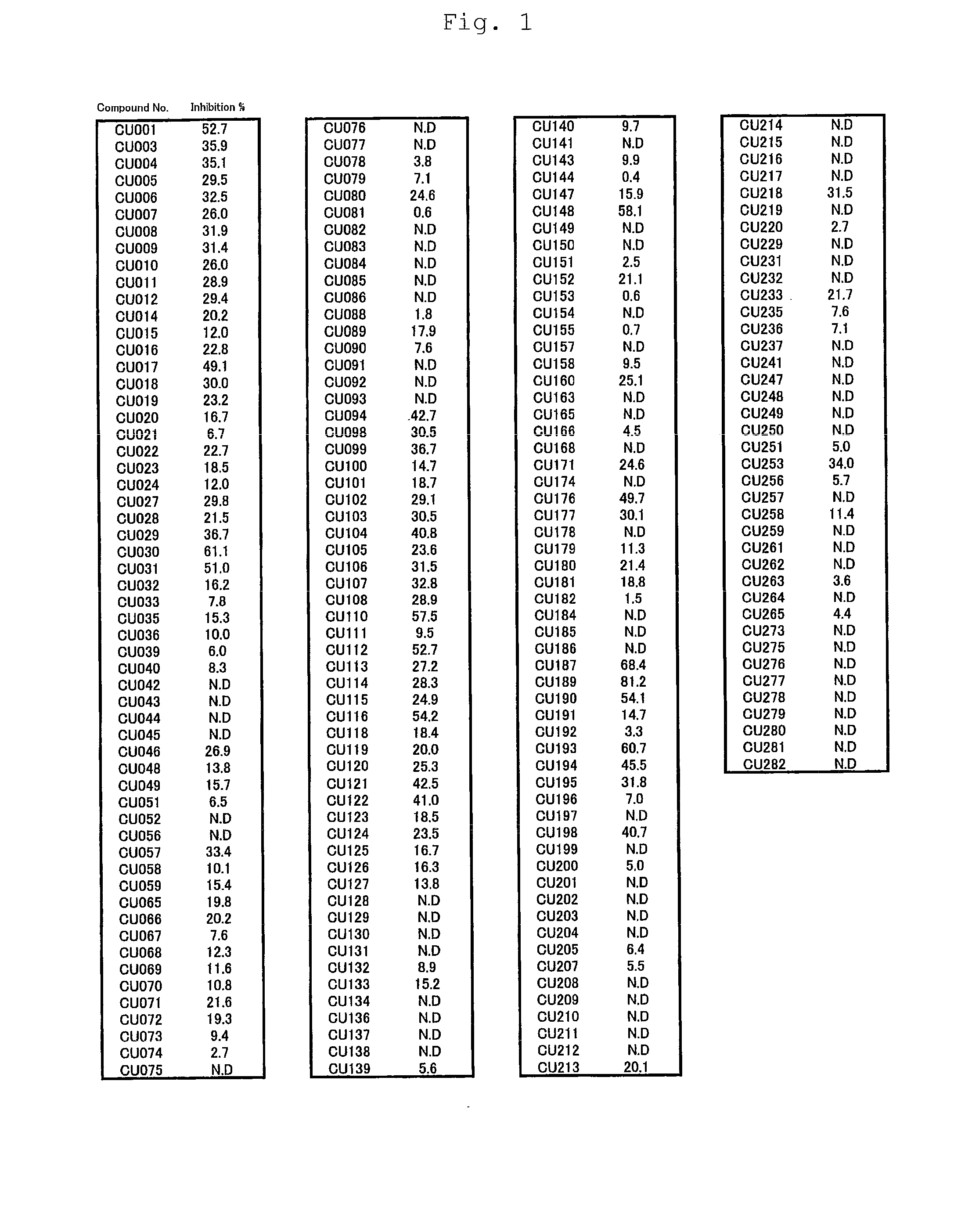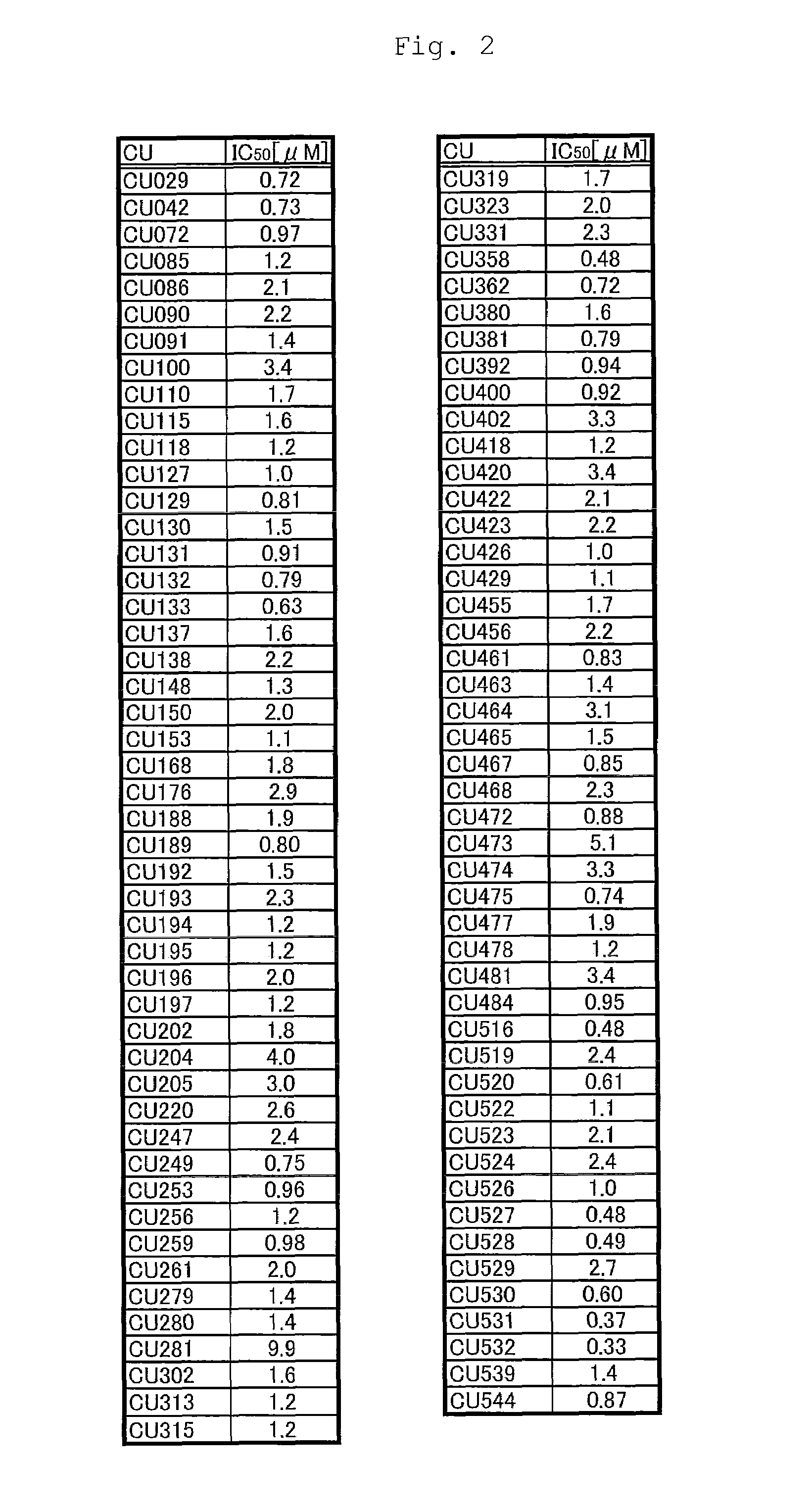Novel curcumin derivative
a curcumin derivative and derivative technology, applied in the field of new curcumin derivatives, can solve the problems of not serving as a disease-modifying drug, and the serious problem of senile dementia, and achieve the effect of preventing or treating alzheimer's diseas
- Summary
- Abstract
- Description
- Claims
- Application Information
AI Technical Summary
Benefits of technology
Problems solved by technology
Method used
Image
Examples
example 1
Synthesis of (1E,6E)-1-(3-hydroxy-2-methoxyphenyl)-7-(4-hydroxy-3-methoxyphenyl)hepta-1,6-diene-3,5-dione (CU001)
[0065]6-(4-Hydroxy-3-methoxyphenyl)hex-5-ene-2,4-dione (20 mg, 85 μmol) and boron trioxide (11 mg, 0.16 mmol) was placed in a 20 mL reaction vessel, and dissolved in 0.4 mL of ethyl acetate. To the stirring mixture at 80° C. was added a solution of 3-hydroxy-2-methoxybenzaldehyde (16 mg, 0.11 mmol) and tri-n-butyl borate (25 μL, 93 μmol) in 0.7 mL of ethyl acetate. After the reaction mixture was stirred for 2 h at the same temperature, n-butylamine (10 μL, 0.10 mmol) was added with additional stirring for 1 h. The reaction mixture was treated with a 1:1 solution of 1N HCl and brine, and was stirred at 50° C. for 5 min to 1 h (if necessary, the reaction mixture was neutralized by saturated NaHCO3 aqueous solution). The organic layer was purified directly by silica gel column chromatography (eluting with hexane / ethyl acetate or chloroform / methanol) to obtain the title compo...
example 2
Synthesis of (1E,6E)-N-{4-[7-(4-hydroxy-3-methoxyphenyl)-3,5-dioxohepta-1,6-dienyl]phenyl}acetamide (CU003)
[0068]The title compound was synthesized using the same procedure employed for Example 1, but with 4-acetamidobenzaldehyde (18 mg, 0.11 mmol) instead of 3-hydroxy-2-methoxybenzaldehyde (16 mg, 0.11 mmol). The product was obtained as a solid (6.6 mg, 20%) having the following characteristics.
[0069]1H NMR (δ, acetone-d6): 2.05 (s, 3H), 3.88 (s, 3H), 5.96 (s, 1H), 6.68 (d, J=16 Hz, 1H), 6.70 (d, J=16 Hz, 1H), 6.84 (d, J=8.2 Hz, 1H), 7.14 (dd, J=1.9, 8.2 Hz, 1H), 7.30 (d, J=1.9 Hz, 1H), 7.56 (d, J=16 Hz, 1H), 7.56 (d, J=16 Hz, 1H), 7.58 (d, J=8.7 Hz, 2H), 7.68 (d, J=8.7 Hz, 2H), 8.1 (brs, 1H, OH), 9.3 (brs, 1H).
[0070]Melting Point 193-195° C., MS (ESI+) m / z 380 (M+1), 402 (M+Na).
example 3
Synthesis of (1E,6E)-1-(4-hydroxy-3-methoxyphenyl)-7-(4-phenoxyphenyl)hepta-1,6-diene-3,5-dione (CU004)
[0071]The Title Compound was Synthesized Using the Same Procedure Employed for Example 1, but with 4-phenoxybenzaldehyde (22 mg, 0.11 mmol) instead of 3-hydroxy-2-methoxybenzaldehyde (16 mg, 0.11 mmol). The product was obtained as a solid (10.8 mg, 31%) having the following characteristics.
[0072]1H NMR (δ, acetone-d6): 3.92 (s, 3H), 6.05 (s, 1H), 6.74 (d, J=16 Hz, 1H), 6.85 (d, J=16 Hz, 1H), 6.89 (d, J=8.2 Hz, 1H), 7.01˜7.08 (m, 3H), 7.14˜7.2 (m, 1H), 7.19 (dd, J=1.9, 8.2 Hz, 1H), 7.35 (d, J=1.9 Hz, 1H), 7.35 (m, 1H), 7.4˜7.47 (m, 4H), 7.62 (d, J=16 Hz, 1H), 7.64 (d, J=16 Hz, 1H), 8.2 (brs, 1H, OH).
[0073]Melting Point 45-46° C., MS (ESI+) m / z 415 (M+1), 437 (M+Na).
PUM
| Property | Measurement | Unit |
|---|---|---|
| temperature | aaaaa | aaaaa |
| temperature | aaaaa | aaaaa |
| reaction time | aaaaa | aaaaa |
Abstract
Description
Claims
Application Information
 Login to View More
Login to View More - R&D
- Intellectual Property
- Life Sciences
- Materials
- Tech Scout
- Unparalleled Data Quality
- Higher Quality Content
- 60% Fewer Hallucinations
Browse by: Latest US Patents, China's latest patents, Technical Efficacy Thesaurus, Application Domain, Technology Topic, Popular Technical Reports.
© 2025 PatSnap. All rights reserved.Legal|Privacy policy|Modern Slavery Act Transparency Statement|Sitemap|About US| Contact US: help@patsnap.com



